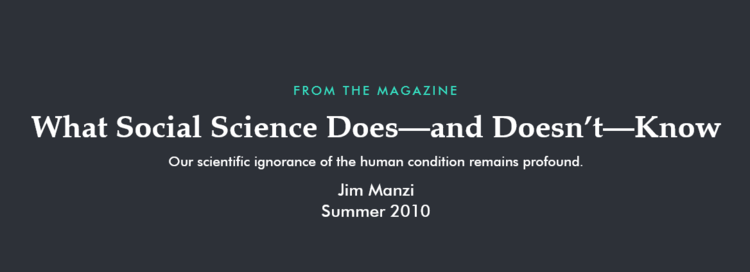
Jim Manzi’s New Article
By Steve Sailer
08/03/2010
Jim Manzi, the marketing researcher turned social commentator (not the Jim Manzi who headed Lotus Development Corporation), has a book coming out. Here’s a chapter summarized in his City Journal article:
What Social Science Does — and Doesn’t — Know
Our scientific ignorance of the human condition remains profound.
Just like me, Jim is a marketing researcher turned pundit, so our thinking runs along the similar lines. As a test marketer, he wants to promote more rigorous experimentation in the social sciences, which is fine.
However, being older, lazier, and stupider than Manzi, I've perhaps gotten a little farther toward grasping some simple underlying principles, since I’m not smart enough to get by without figuring them out. He writes:
Unlike physics or biology, the social sciences have not demonstrated the capacity to produce a substantial body of useful, nonobvious, and reliable predictive rules about what they study — that is, human social behavior, including the impact of proposed government programs …
Another way of putting the problem is that we have no reliable way to measure counterfactuals — that is, to know what would have happened had we not executed some policy — because so many other factors influence the outcome. This seemingly narrow problem is central to our continuing inability to transform social sciences into actual sciences. Unlike physics or biology, the social sciences have not demonstrated the capacity to produce a substantial body of useful, nonobvious, and reliable predictive rules about what they study — that is, human social behavior, including the impact of proposed government programs.The missing ingredient is controlled experimentation, which is what allows science positively to settle certain kinds of debates. How do we know that our physical theories concerning the wing are true? In the end, not because of equations on blackboards or compelling speeches by famous physicists but because airplanes stay up. Social scientists may make claims as fascinating and counterintuitive as the proposition that a heavy piece of machinery can fly, but these claims are frequently untested by experiment …
That all sounds plausible, but I've been a social science stats geek since 1972, when the high school debate topic that year was education, so I’m aware that Manzi’s implications are misleading.
First, while experiments are great, correlation studies of naturally occurring data can be extremely useful. Second, a huge number of experiments have been done in the social sciences.
Third, the social sciences have come up with a vast amount of knowledge that is useful, reliable, and nonobvious, at least to our elites.
For example, a few years, Mayor Bloomberg and NYC schools supremo Joel Klein decided to fix the ramshackle admissions process to the gifted schools by imposing a standardized test on all applicants. Blogger Half Sigma immediately predicted that the percentage of Asians and whites admitted would rise at the expense of blacks and Hispanics, which would cause a sizable unexpected political problem for Bloomberg and Klein. All that has come to pass.
This inevitable outcome should have been obvious to Bloomberg and Klein from a century of social science data accumulation, but it clearly was not obvious to them.
No, the biggest problem with social science research is not methodological; it’s that we just don’t like the findings. The elites of America don’t like what the social sciences have uncovered about, say, crime, education, discrimination, immigration, and so forth.
What we’ve learned are things like:
- IQ matters
- Race matters
– Sex matters
– Class matters
– Heredity matters
– Character matters
– Discipline matters
And, judging by what I read every day, the attitude of the dominant people in America toward this knowledge is mostly fear and loathing. Those who explain how to use the knowledge uncovered by the social sciences are routinely vilified. Men of outstanding character, heroes of the human sciences such as Charles Murray and Arthur Jensen are subjected to massive campaigns of demonization.
In reality, after a century of experimentation and analysis, we know an awful lot about several major human conditions, such as IQ. What we don’t know about IQ is how to intervene to reliably narrow racial gaps in average educational achievement (other than hitting Asian and white kids on the head with a ballpeen hammer).
Much the same is true regarding many other topics. Manzi’s article gets better as he gets toward his conclusion:
First, few programs can be shown to work in properly randomized and replicated trials. …Second, within this universe of programs that are far more likely to fail than succeed, programs that try to change people are even more likely to fail than those that try to change incentives.
And third, there is no magic. Those rare programs that do work usually lead to improvements that are quite modest, compared with the size of the problems they are meant to address or the dreams of advocates.
Given all that, you can readily arrive at my oft-repeated point of view, which is that the one potential government policy that is likely to have reliable major long term effects on social problems, for good or for bad, is immigration. Since government policies can seldom change people, government policy should select immigrants who will likely benefit the current citizens of the nation and keep out those who likely won’t. When you find yourself in a hole, the first thing to do is to stop digging.
This has been the philosophy of Canada’s immigration system for decades, and it has worked fairly well for them. Yet, advocates of a Canadian-style immigration policy philosophy for America are routinely subjected to Two-Minutes Hates in this country. Thus, social policy discourse in the U.S. makes much less progress than social science research.
